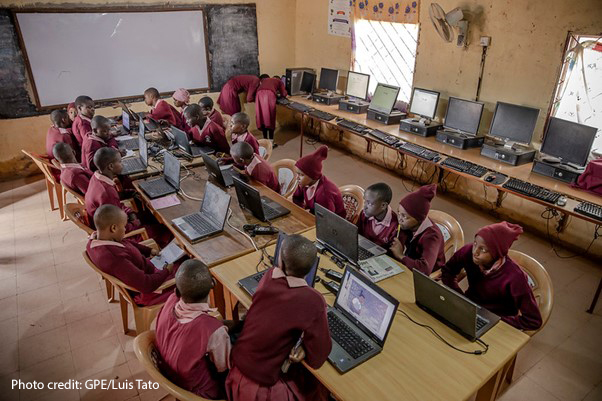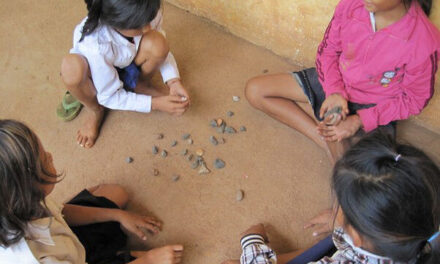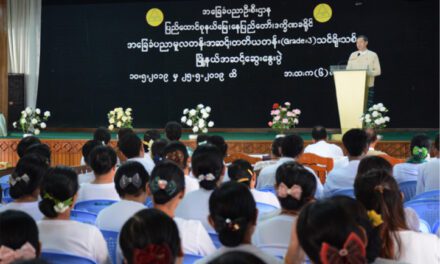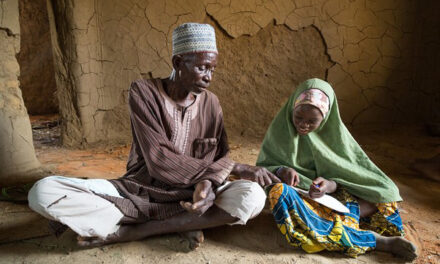This blog was written by Choah Park, a PhD candidate at University College London. It is based on a presentation of the initial findings of her Phd project given at the 2023 UKFIET conference.
COVID has been portrayed as a disruptive crisis event leading to the inevitable transition to the digitalisation of society. Digital technologies employed during school closures have been promoted as solutions to educational problems and to education reforms for the future. Global organisations including UNESCO, the OECD, and the World Bank have been at the centre of driving these digital transformations of education initiatives, narrating the story of crisis and opportunities to build back better. COVID has been demonstrating these organisations’ condensed struggle for making and governing the future, illustrating notable historical and power relations underlying the digitalisation and broadly international development projects.
The neglect of the ‘social’ in the digital transformation story
In the 2022 OECD education policy committee ministerial high-level policy forum, the keynote speech emphasised the ‘promethean moment when we have to change everything now’ due to ‘a technological energy release.’ The way to this change was ‘no longer on a left, right spectrum’ but ‘with complex adaptive coalitions where business leaders, educators, philanthropists, and governments all work together to create solutions.’ Despite this epochal narration and ‘digital hype’, the promotion of technological solutions to educational problems and partnerships (coalitions here) has a long history. Around the Sputnik crisis in 1957, Skinner’s teaching machine was advocated for personalised learning and education reform. The notion of partnerships emerged in the 1970s as seen in the World Bank’s Pearson Report and the OECD’s Interfutures report. The depoliticisation of the partnerships and digitalisation itself is further questionable, considering the rapidly expanded ed-tech market. These lead to the questions about whose knowledge and interests are reflected in the digital transformation initiatives.
A brief history of global organisations’ education for development
Global organisations have long competed to determine a prevailing vision for education and development with disparate mandates since their establishment. While UNESCO has advocated education as a human right, the OECD and World Bank have promoted education as investment in economic growth. Global organisations’ contestations over the dominant visions have been intertwined with international relations and been particularly manifested upon global crises: in the emerging field of educational planning in the 1960s following the Sputnik crisis; in crafting the post-world war order responding to the third worldism and environmentalism around the 1970s’ oil crises; in the contested ideas of lifelong learning around UNESCO’s knowledge society and OECD’s knowledge economy in the late 1990s; in monitoring the progress towards global development goals (e.g. MDGs, SDGs) since the 2000s; and, in maintaining the authority of science providing the so-called evidence-based policymaking solutions based on their large-scale international assessments up to now.
Contested socio-technical imaginaries in digital transformation initiatives
Despite the seemingly converging digital transformation story, global organisations’ reform proposals have illustrated somewhat distinctive socio-technical imaginaries. Socio-technical imaginaries are ‘collectively held, institutionally stabilised, and publicly performed visions of desirable futures, animated by shared understandings of forms of social life and social order attainable through, and supportive of, advances in science and technology’. The organisations’ nuanced socio-technical imaginaries have been interrelated to their historical visions and policy agendas. To name a few, the OECD employed its scenario method in ‘Four OECD scenarios for the future of schooling’ as in its 1979 Interfutures project. Despite nuanced descriptions, these scenarios narrated the key role of digital technology for individualised and flexible learning and for building the ecosystem of lifelong learning. In the ‘building the future of education’ report, the OECD continued to frame lifelong learning as skills training which ‘has become an expectation for all from the changed nature of work and the demand for skills upon the disruption generated by COVID.’ The World Bank also kept drawing on cost analysis in education, aspiring to ‘evidence-based technology solutions in education.’ In its recent ‘RAPID Framework to Address COVID 19 Learning Losses and Build Forward Better,’ the scalability of digital learning was highlighted based on ‘the cost analysis of different instructional approaches with the information on per-student costs (e.g. computer-assisted learning programme) and on educational outcomes (e.g. math scores)’.
UNESCO produced somewhat conflicting stories. Its 2023 Digital Learning Week resonated with UNESCO’s historical mission towards education as public good and humanistic education. The International Commission on the Futures of Education’s latest flagship report maintained its critical lens on international development issues as it did for the globalisation through its 1996 Delors report. It further argues that ‘the generation of knowledge and evidence through South-South and triangular cooperation must be strengthened beyond North-South flows of aid to education.’ Its provocative voice also emerged in ‘An ed-tech tragedy?’. Nevertheless, UNESCO’s Global Education Coalition has been central in promoting the multi-stakeholder partnership, brining around 200 members.
Global partnerships and development aid as digital transformation drivers
Global organisations’ visions have been rapidly materialised into national COVID policy actions through partnerships and development aid. However, their partnership activities have often involved partners’ products or services, illustrating notable patterns – e.g. ‘the French-speaking African regional online learning platform’. Microsoft’s Learning Passport Platform has undergone ‘rapid expansion as an extraordinary emergency response to COVID, reaching to 36 countries’ located in the global south. These historical and geopolitical relations between global solutions providers and recipients have illustrated arguably the colonial relations reinscribed in the global practices of partnerships and development aid.
Politics and power in digitalisation and international development projects
The words of ‘international,’ ‘development,’ and ‘globalisation’ (and now ‘digitalisation’) have been treated as being politically neutral, avoiding questions about the political positioning of the knowledge about societies. The current digital transformation initiatives may need to be portrayed as a political project rather than the ‘new normal’. They are a concerted global project considering its duration (e.g. the World Bank’s nascent ICT in education initiatives in Africa in the early 2000s) and policy networks and money being channeled. COVID-derived reform movements have put the digitalisation as the urgent priority for many low-income countries still struggling from lacking school infrastructures. This can be the new imperialism in education ‘limiting the capacity of low-income countries to determine their own educational agendas’. The promotion of partnerships as solutions to local problems further seems to reproduce the historical dependency on global organisations and donors, reframing the political question of ‘reparations’ into the technical issue of development aid. Towards decolonising practices of knowledge, there needs to be more space for these social agendas in the current technical discussion of digitalisation and broadly international development projects.





